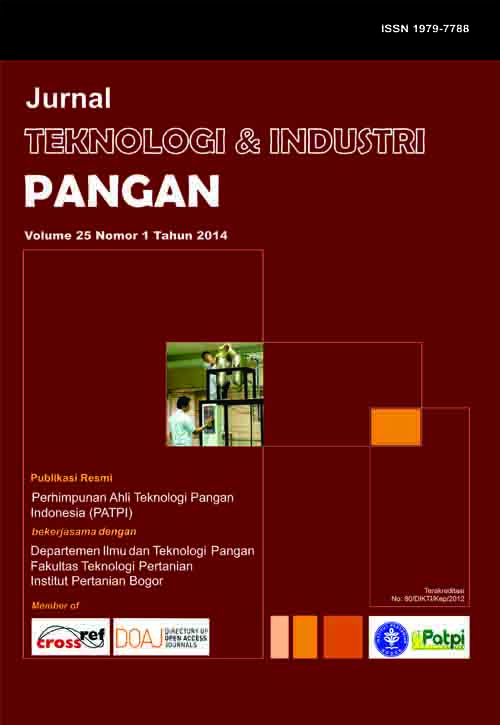KARAKTERISASI FISIKOKIMIA NANOKALSIUM HASIL EKSTRAKSI TULANG IKAN NILA MENGGUNAKAN LARUTAN BASA DAN ASAM [Physicochemical Characterization of Nano Calcium from Tilapia Bone Extracted by Alkaline and Acid Solution]
Abstract
KARAKTERISASI FISIKOKIMIA NANOKALSIUM HASIL EKSTRAKSI TULANG IKAN NILA
MENGGUNAKAN LARUTAN BASA DAN ASAM
[Physicochemical Characterization of Nano Calcium
from Tilapia Bone Extracted by Alkaline and Acid Solution]
Vanessa Lekahena1)*, Didah Nur Faridah2), Rizal Syarief2) dan R. Peranginangin3)
1) Fakultas Pertanian, Universitas Muhammadiyah Maluku Utara, Ternate
2) Departemen Ilmu dan Teknologi Pangan, Fakultas Teknologi Pertanian, Institut Pertanian Bogor, Bogor
3) Balai Besar Penelitian dan Pengembangan Pengolahan Produk dan Bioteknologi, Kementerian Kelautan dan Perikanan, Jakarta
Diterima 26 Maret 2013 / Disetujui 29 April 2014
ABSTRACT
The utilization of tilapia (Oreochromis niloticus) bones as a source of natural calcium was done by alkaline (NaOH) and acid (HCl) extraction. The extraction process aims to soften the bones are milled using disc mill into nano sized calcium powder or nanocalcium. The objective of this research was to study the physicochemical properties of nanocalcium obtained from alkaline and acid extraction of tilapia bones. The results of physicochemical analysis properties of nanocalcium sample showed that nanocalcium extracted by alkaline solution had better properties than that of the untreated sample and nanocalcium extracted by acid solution. The results was indicated by the higher yield, brighter colors, smaller particle size, and calcium content (20.67%) and phosphorus (10.09%) with a ratio of Ca/P = 2.0. The Fourier Transform Infrared (FTIR) spectra profile indicated the presence of phosphate group (PO43-) at the bands of 469, 563, 603, 961 and 1035 cm-1, and the presence of apatite carbonate group (CO32-) was indicated by intense bands at 873, 1416, 1456 and 1563 cm-1. The morphology of the sampel surface of the alkaline extracted sample was smoother, denser, and the grain size formed were relatively larger. The formed crystalline phases were HAp (hydroxyapatite), carbonate apatite type A [Ca10(PO4)6CO3] and B [Ca10(PO4)3(CO3)3(OH)2] with crystalline degree of 78.4%.

